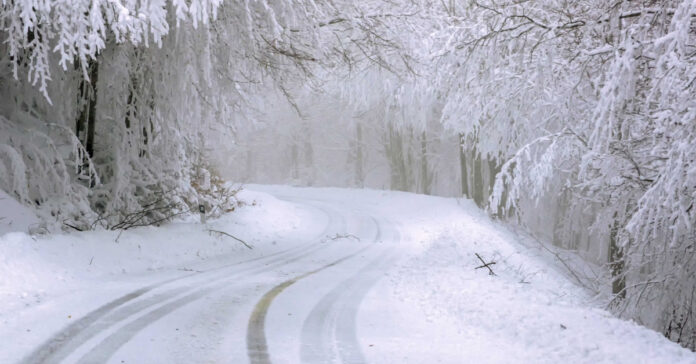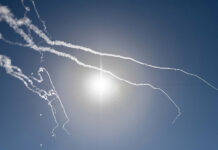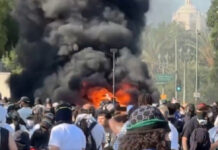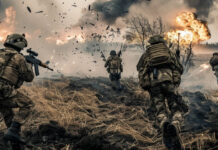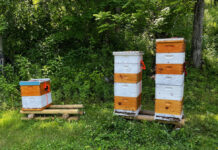Welcome back! I hope you all had a merry Christmas despite the weather. My daughter made it up the mountain before the blizzard hit, but our Christmas Dinner guests had to cancel due to the weather.
The Christmas Weekend Blizzard has come and gone. We had snow, but it wasn’t bad. The temperatures fell below zero, but they were manageable. The wind, however, was terrible.
I don’t have a way to measure the wind-chill factor when the front blew through, but I’ve heard it was -30°F. The chickens didn’t leave their coop, and on the way back from our walk, the dogs kept stopping to lick her feet. After my first dog walk, I started putting on ski pants to cut the wind and keep my legs warm. I wore wool balaclava under my knit cap and sunglasses to keep the wind out of my eyes.
The next day, when it was 4°F and sunny, felt much nicer. I worked up a sweat doing homestead chores. The tarp blew most of the way off the bales of hay, again, and the tarp over one of our woodpiles was about 50 percent loose. Throwing a pallet on top of the tarp will hold it down, but individual chunks of firewood isn’t very effective in high winds. Bungee cords also work and can keep the ends from flapping, but they lose their elasticity when they get wet and then freeze.
The best news is that we haven’t run out of water due to frozen pipes (yet). We have two friends who lost water when their well heads froze. This happened to me once in a prior house. We ran multiple extension cords to the well head and wrapped a heating pad around the pipes to thaw them out.
Power Outage
We lost power for about 15 hours the day the storm hit. Still, that was four hours less than some outages in this area. We cooked all our meals on the wood stove.
After six hours, we gave up waiting on the utility and wheeled the generator outside. After running the extension cords and checking the oil, I fired it up. It started on the second pull, giving us power for the refrigerator and freezer. We also ran some lights, but had no internet or phone service.
The temperature in the basement where the stove is located hovered at around 69°. It was colder upstairs, reaching 54° in some areas. The attached garage fell to 45°. We set up a folding table and ate and played board games in the basement. We even watched a DVD. (With no internet, streaming was not an option.) We had only about a dozen to choose from.
That night, when I gave the dog her nighttime walk, I noticed lights from a house down the mountain from us. That worried me because I assumed a power line must be down between us and them. Because we are near the end-of-the line, I figured it would be a day or two before they made it up here to fix our problem. I grabbed another armful of firewood and headed inside, only to find the basement was lit up. My daughter reported power was restored the very moment I took the dog out.
A fallen tree caused our power outage, but many places across the country experienced rolling blackouts. I’ve read of them in Mississippi, Texas, North Carolina, and Tennessee, and there may have been others. Let’s thank the EPA for forcing those coal-burning electricity plants out of business over the past decade. Now the country can no longer generate enough power to meet peak demand.
Cold Weather Survival
We have a powerful wood stove, yet the temperature in parts of our house fell from the 70s into the mid 50s after just 12 hours of cold weather. Friends with lots of windows reported that their house was never above 60 degrees, even with their stove and furnace running constantly. Imagine living in an old, rickety wood house built in the 1930s.
This weekend’s weather made it clear to me how people in Texas could freeze to death in 2021. Hypothermia doesn’t require freezing temperatures. It just has to be cold enough for your body temperature to sink below 95 degrees. If you are unprepared, a sudden temperature drop like the bomb cyclone brought could be deadly.
We are well prepared for the cold, with down comforters, warm sleeping bags, long underwear, and parkas. These are things people might not have if they live outside Houston, where temperatures can reach triple digits for more than 90 days a year, but snowflakes are rare. I have at least four pairs of winter gloves and two pairs of insulated boots. (This allows me to rotate in a new pair while the others dry.) I doubt people living in the Deep South have either.
I’m surprised all our chickens survived the cold. Several of them have not recovered from their molt and have patches of exposed skin on their backs. I kept the chickens in their coop for close to 72 hours. No free range Christmas for them. The birds didn’t seem to mind. When I opened the chicken coop door, they would peek out, but none of them jumped for it. One ran down a few steps, turned around and headed back inside to the warmth.
The chicken’s waterer froze every few hours, so I had to give them fresh water several times a day. That allowed me to harvest any eggs before they froze and cracked.
Prepping Ramifications
Every time I walked the dog at 11 p.m. with blowing snow limiting visibility to less than 100 feet, I thought about how difficult to maintain any kind of lookout or run a patrol in subzero weather with winds gusting to 50 or more mph. I guess you could swap out personnel every hour. Maybe a well-designed bunker would shelter a guard from the worst of the wind, but with limited movement, it would be easy to grow cold.
You could carry a metal bucket of hot coals into the bunker, plus a thermos of hot tea. Having a camp stove in the lookout bunker would give the position away, defeating its purpose.
It would be tempting to think that no one would attack on such a night. And 99 times out of a 100, you would be right. But what about that one group of hardened marauders who have been waiting for you to show a moment of weakness? Could they climb the mountain in the dark in blizzard conditions? Yes, if they had discipline and warm enough clothing.
Heck, the wind was howling so badly, they could drive three-quarters of the way up the mountain and no one would hear them.
Could your jealous neighbors attack? The cold might hurt their combat effectiveness, but it would surely motivate them to win rather than hike home or die in the cold.
None of my prepper books and tactical guides adequately addresses this. If you have suggestions, leave them in the comments.

